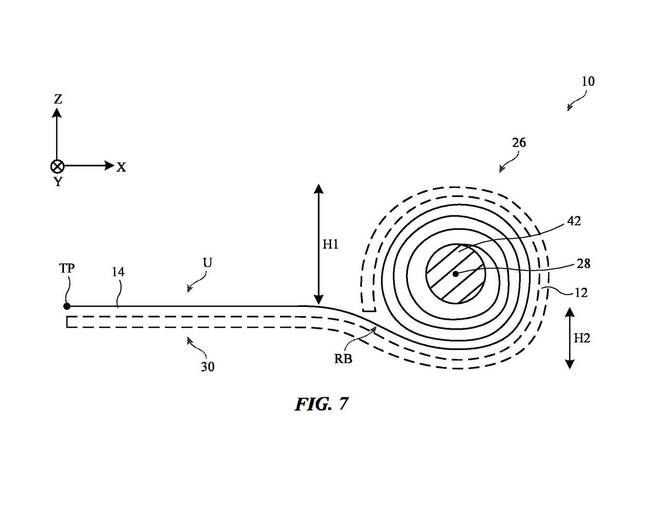Apple Seeks Patent For Devices With Roll-up Displays – IRoll?

An Apple patent application indicates that Cook and Company are possibly entertaining the idea of adding roll-up screens to everything from the all-in-one iMac to the iPhone – and even wearables.
Apple is seeking a patent [PDF] for displays that could be rolled up, all while still being protected by a thin layer of glass. To keep the surface of the screen from shattering, the glass layer could be "locally thinned" and made to be placed under compressive stress as it is rolled to "prevent damage to the display when … bent during rolling operations."
Scratches on the surface of an ultra-thin glass screen, Apple states in the application, can become weak points in the surface that make them prone to cracking when rolled. Rather than introducing new tech into its rolling concept, Apple engineers designed their newfangled roll-up screen to include a small "reverse bend" where the screen enters the device housing.

The reverse bend (RB) in Apple's roll-up screen design ... Source: Patent application 2023/0221766 A1
"In reverse bend portion, the outer surface of the glass layer of display is exposed to tension, whereas the inner surface of this glass layer is exposed to compression," Apple says in the patent filing, adding that the reverse bend design also means storage space for the rolled screen will have less of a protrusion "and may thereby enhance the appearance of device."
Don't start lining up for the iRoll yet
As it's always necessary to state when a patent application emerges, there's little reason to assume the design will make it into a commercially available device. Just as well, Apple has a long history of filing for patents that never go beyond the stage of calling dibs.
It's also worth noting that publication of a patent doesn't mean it's been granted. Rather, patents are published to keep industries abreast of new developments to help spur competition and allow other companies to benefit from the work in case a patent isn't granted.
It's far more likely that Apple will release a foldable, perhaps in the next year, that may even be able to close itself to protect the screen in case it gets dropped. Releasing such a device would give Apple a chance to close the growing innovation gap between itself and Samsung, which has leaned hard into folding devices.
- UK court sides with Optis Cellular Technology in Apple 4G patent clash
- Now Apple takes a bite out of encryption-bypassing 'spy clause' in UK internet law
- Oh, wow. OK. Apple really is making a $3.5K VR ski-mask. Dev tools are now out for it
- Apple squashes kernel bug used by TriangleDB spyware
If it does pursue a rollable screen, Apple would still put itself in competition with Samsung and its Flex OLED that the company said could be used for rolling screens, as well as Lenovo and Motorola, each of which have unveiled rollable devices in the past 12 months.
Whether rolling screens can be scaled up to meet potential production demands and a reasonable price point is another matter entirely, however.
LG, which was reportedly working on a rollable phone dubbed Project Explorer, put the project on ice in early 2021 before shuttering its cellphone business entirely a few months later.
LG didn't give up on rolling screens, though – at least not immediately.
Launched in late 2020, LG's Signature OLED R was still on sale in August of 2021 when it came to the US a few months after the Korean tech giant gave up on mobile devices. The 65-inch television was designed to retract into a minimalist base with a built-in soundbar, but its eye-watering $100,000 price made it accessible to a limited few customers.
Head over to LG's website today, and you'll still find the Signature OLED R listed, but with the added note that it's been discontinued. In a call to LG to inquire about the unit, we were told it was axed in 2022. Whether that's because of the price or overly complicated engineering isn't clear.
One thing is, though: LG isn't offering any other roll-up OLED TV in 2023, nor any other rolling device for that matter. ®
From Chip War To Cloud War: The Next Frontier In Global Tech Competition
The global chip war, characterized by intense competition among nations and corporations for supremacy in semiconductor ... Read more
The High Stakes Of Tech Regulation: Security Risks And Market Dynamics
The influence of tech giants in the global economy continues to grow, raising crucial questions about how to balance sec... Read more
The Tyranny Of Instagram Interiors: Why It's Time To Break Free From Algorithm-Driven Aesthetics
Instagram has become a dominant force in shaping interior design trends, offering a seemingly endless stream of inspirat... Read more
The Data Crunch In AI: Strategies For Sustainability
Exploring solutions to the imminent exhaustion of internet data for AI training.As the artificial intelligence (AI) indu... Read more
Google Abandons Four-Year Effort To Remove Cookies From Chrome Browser
After four years of dedicated effort, Google has decided to abandon its plan to remove third-party cookies from its Chro... Read more
LinkedIn Embraces AI And Gamification To Drive User Engagement And Revenue
In an effort to tackle slowing revenue growth and enhance user engagement, LinkedIn is turning to artificial intelligenc... Read more

